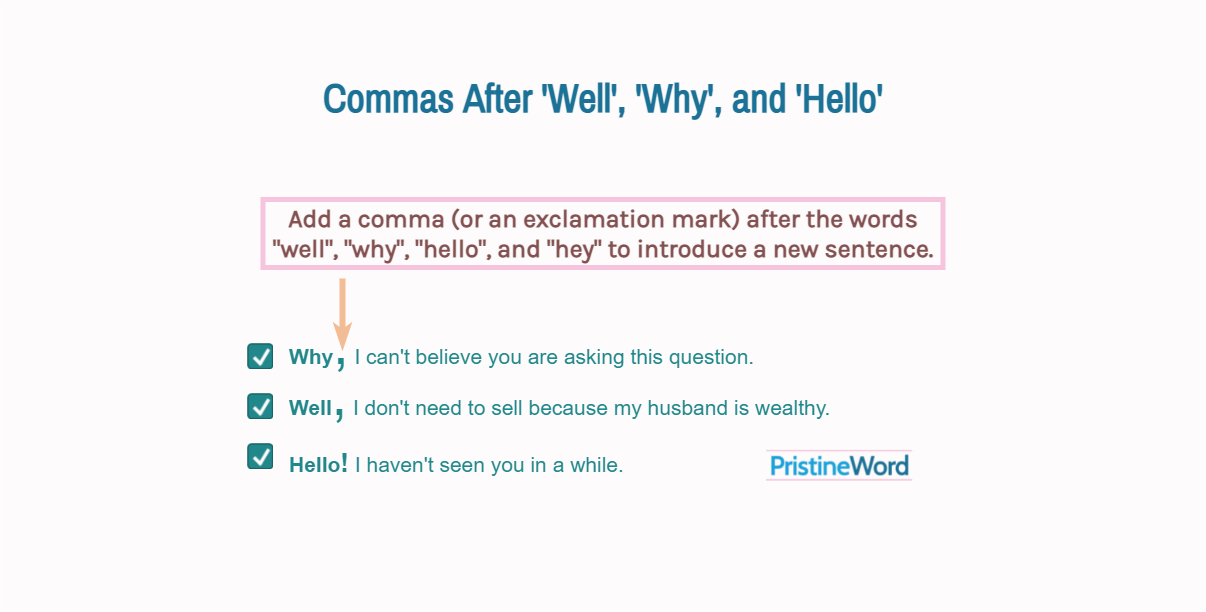Add a comma after the words well, why, hello, and hey to introduce a new sentence. Alternatively, you can use an exclamation mark to show emphasis, emotion, or surprise. An exclamation mark after these introductory words replaces a comma.
Add a comma after the words well, why, hello, and hey to introduce a new sentence.
Why, I can't believe you are asking this question.
Well, I don't need to sell because my husband is wealthy.
Well I don't need to sell because my husband is wealthy.
Alternatively, you can use an exclamation mark to show emphasis, emotion, or surprise.
Why! You're always making me feel guilty.
Remember, an exclamation mark replaces a comma.
Hello! I haven't seen you in a while.
Hello!, I haven't seen you in a while.
1. Well
When introducing a new sentence, place a comma after "well" to signal a brief pause .
Well, I would say that she is not happy with her relationship.
Well I would say that she is not happy with her relationship.
In sentences like these, the filler word "well" suggests that the writer is pausing or hesitating.
If you ask me about the new computer, well, I would say that it is running slow.
As an adverb, we do not add a comma after "well".
Things are going well lately.
As an adjective, "well" means "in good health". Avoid the comma in this case.
Olivia was sick last week, but she is well now.
More Examples
- Well, I've never seen anything like this.
- Well, I would buy either an electric vehicle or a hybrid.
- What do you want for dinner? Well, I'm in the mood for Chinese food.
- Well, thinking before you speak is important for all kinds of situations.
- That is, well, not always true.
- Well, that would depend on the particular circumstances.
2. Why
Place a comma after "why" to introduce a sentence while expressing mild surprise or uncertainty.
Why, I cannot believe you went to the party without permission.
Why I cannot believe you went to the party without permission.
We can also use a comma after "why" to express indignation.
Did you lie to me? Why, of course not!
In sentences like these, why is an interjection. Frequently, interjections appear at the start of a sentence. They can be followed by an exclamation mark or a comma. An exclamation mark after "why" indicates a more intense emotion or surprise.
Why! Did you get the job?
Why, did you get the job?
An exclamation mark replaces a mid-sentence comma.
Why! Stop being so dramatic.
Why!, Stop being so dramatic.
"Yes" and "No" are also common interjections that are frequently used to introduce a sentence. Follow the same comma rules after "yes"/"no".
We should not add a comma after "why" when using it as an adverb, a noun, or a conjunction.
This is why you snore and what you can do about it.
I have a severe headache. This is why I am not happy.
Why are you yawning?
More Examples
- Do you believe in God? Why, you are always asking philosophical questions.
- Did you kill him? Why, of course not!
- Why! I think you are overreacting.
- Are you happy? Why, do I look happy?
- Follow me. Why, where are you going?
3. Hello and Hey
The interjections hello and hey should be followed by a comma when introducing a new sentence.
Hello, how are you?
Hello how are you?
Hey is commonly used at the start of a sentence to draw attention.
Hey, look over there.
You can also use hey to show indignation.
Hey, stop insulting me!
In informal situations, hey is a synonym of hello.
Hey, what's going on?
An exclamation mark after hello or hey always replace a comma.
Hello! Nice day, isn't it?
Hey! What do think of the latest news?
Hey!, What do think of the latest news?
Hello can also be a noun. We do not usually place a comma after "hello" in this case.
Give John a hello from me when you see him.
Give John a hello, from me when you see him.
More Examples
- Hello, can I help you?
- Hey, who's there?
- "Hello, James," Rebecca said in her thick accent.
- Hey! Where are you going to?
- Hello, can I have a beer?
- Hey, Olivia, I haven't seen you for ages.
4. Other Introductory Words
Other introductory words and phrases, such as "by the way", "namely" or "that is" need a comma to introduce a series of terms or clarify what has been said.
I love Japanese food, namely, Sushi and Sashimi.
Similarly, for example and for instance should be followed by a comma to introduce a list of items.
I like extreme sports, for example, skydiving and ice climbing.
The abbreviations "e.g." and "i.e." should also be enclosed by commas in the middle of a sentence.
Some high-fiber fruits, e.g., bananas, apples, and oranges, helps you maintain a healthier weight over time.

